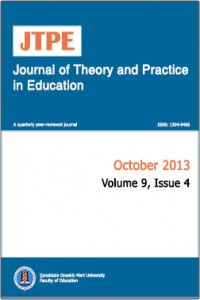Öz
The purpose of the present study is twofold. It investigated both what metacognitive online reading strategies the Turkish EFL students report using for academic purposes; and how they use the reported strategies in actual reading tasks. Data came from Online Survey of Reading Strategies (Anderson, 2003), think-aloud protocols and post-reading interview. Results of this study revealed that the students who participated in this study reported a wide range of metacognitive strategies when reading online academic texts. Using reference materials (i.e. online dictionaries), scrolling through the text, rereading for better understanding, guessing what the content is about and paying closer attention to reading appeared to be the most frequently reported strategies. Moreover, the students employed most of the strategies they stated in the survey while they were reading online texts.
Anahtar Kelimeler
Kaynakça
- Akyel, A. S. & Erçetin, G. (2009). Hypermedia Readinmg Strategies Employed by Advanced Learners of English, System, 37:136-152.
- Anderson, N. J. (2003). Scrolling, clicking, and reading English: Online reading strategies in a second/foreign language. The Reading Matrix, 3:1-33.
- Cohen, A. D.(1998). Strategies in learning and using a second language. New York: Longman
- Huang, H., Chern, C. & Lin, C. (2009). EFL Learners’ Use of Online Reading Strategies and Comprehension of Texts: An Exploratory Study, Computers and Education, 52:13-26.
- Leu, D.J., Kinzer, C.K., Coiro, J.L. & Cammack, D.W. (2004). Toward a Theory of New Literacies Emerging from the Internet and Other Information and Communication Technologies. In R.B. Ruddell & N. Unrau (Eds.), Theoretical models and processes of reading (pp. 1570-1613). Newark, DE: International Reading Association.
- Leu, D. J., Zawilinski, L., Castek, J., Banerjee, M., Housand, B., Liu, Y., & O’Neil. M. (2007). What is new about the new literacies of online reading comprehension? In L. Rush, J. Eakle, & A. Berger, (Eds.). Secondary school literacy: What research reveals for classroom practices, 37-68.
- Nachmias, R., & Gilad, A. (2002). Needle in a hyperstack: Searching for information on the World Wide Web. Journal of Research on Technology in Education, 34: 475–486.
- O’Malley, J. M., & Chamot, A. U. (1990). Learning strategies in second language acquisition. New York: Cambridge University Press.
- Pookcharoen, S. (2009). Metacognitive Online Reading Strategies among Thai EFL University Students. Unpublished Doctoral Dissertation, Indiana University.
BİR YABANCI DİL OLARAK İNGİLİZCE ÖĞRENEN ÖĞRENCİLERİN UYGULADIĞI ÜSTBİLİŞSEL ÇEVRİMİÇİ OKUMA STRATEJİLERİ
Öz
Bu çalışmanın iki temel amacı bulunmaktadır. Hem bir yabanci dil olarak ingilizce öğrenen öğrencilerin
kullandıklarını belirttikleri üstbilişsel çevrimiçi okuma stratejilerini araştırmayı hem de belirttikleri stratejileri
ne ölçüde kullandıklarını araştırmayı amaçlamaktadır. Bu çalışma için veriler Çevrimiçi Okuma Stratejileri
anketi, sesli düşünme ve okuma sonrası yapılan görüşmelerden elde edilmiştir. Sonuçlar öğrencilerin
çevrimiçi okuma yaparken birçok üstbilişsel strateji kullandıklarını ortaya çıkartmıştır. Çevriçi sözlük
kullanımı, tüm metni fare yardımıyla taramak, daha iyi anlamak için tekrar okumak gibi stratejiler en sık
belirtilen stratejiler arasındadır. Bunun da ötesinde aynı öğrenciler sıklıkla belirttikleri stratejileri çevrimiçi
metin okurken uygulamışlardır.
Anahtar Kelimeler
Üstbilişsel okuma stratejileri yabancı dil olarak İngilizce çevrimiçi okuma.
Kaynakça
- Akyel, A. S. & Erçetin, G. (2009). Hypermedia Readinmg Strategies Employed by Advanced Learners of English, System, 37:136-152.
- Anderson, N. J. (2003). Scrolling, clicking, and reading English: Online reading strategies in a second/foreign language. The Reading Matrix, 3:1-33.
- Cohen, A. D.(1998). Strategies in learning and using a second language. New York: Longman
- Huang, H., Chern, C. & Lin, C. (2009). EFL Learners’ Use of Online Reading Strategies and Comprehension of Texts: An Exploratory Study, Computers and Education, 52:13-26.
- Leu, D.J., Kinzer, C.K., Coiro, J.L. & Cammack, D.W. (2004). Toward a Theory of New Literacies Emerging from the Internet and Other Information and Communication Technologies. In R.B. Ruddell & N. Unrau (Eds.), Theoretical models and processes of reading (pp. 1570-1613). Newark, DE: International Reading Association.
- Leu, D. J., Zawilinski, L., Castek, J., Banerjee, M., Housand, B., Liu, Y., & O’Neil. M. (2007). What is new about the new literacies of online reading comprehension? In L. Rush, J. Eakle, & A. Berger, (Eds.). Secondary school literacy: What research reveals for classroom practices, 37-68.
- Nachmias, R., & Gilad, A. (2002). Needle in a hyperstack: Searching for information on the World Wide Web. Journal of Research on Technology in Education, 34: 475–486.
- O’Malley, J. M., & Chamot, A. U. (1990). Learning strategies in second language acquisition. New York: Cambridge University Press.
- Pookcharoen, S. (2009). Metacognitive Online Reading Strategies among Thai EFL University Students. Unpublished Doctoral Dissertation, Indiana University.
Ayrıntılar
| Birincil Dil | İngilizce |
|---|---|
| Konular | Eğitim Üzerine Çalışmalar |
| Bölüm | Makaleler |
| Yazarlar | |
| Yayımlanma Tarihi | 10 Temmuz 2013 |
| Gönderilme Tarihi | 10 Temmuz 2013 |
| Yayımlandığı Sayı | Yıl 2013 Cilt: 9 Sayı: 4 |

